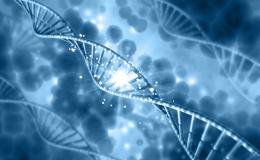Is Liver Cancer Hereditary?
August 3, 2020
Liver cancer is the most common type of cancer in some sub-Saharan and Southeast Asian countries. While liver cancer is much less common in the United States, the incidence rates of liver cancer have tripled since 1980. Here, we outline the symptoms, causes and treatments for liver cancer, and how genetics can contribute to disease development.

Symptoms
The vast majority of liver cancers are classified as hepatocellular carcinomas (HCC) or intrahepatic cholangiocarcinomas. HCC is the most common type of liver cancer; it develops as either a single tumor or multiple smaller cancers throughout the liver. Intrahepatic cholangiocarcinoma is cancer of the bile ducts, the conduits that transport bile to the gallbladder, and accounts for about 10-20% of liver cancer diagnoses.
Symptoms are uncommon in the early stages of liver cancer. Symptoms, once they develop, may include:
- Unintentional weight loss
- Pain in the upper abdomen
- Nausea and vomiting
- Appetite loss
- Weakness and fatigue
- Enlarged abdomen
- Jaundice (yellowing of the skin and whites of eyes)
- White stool
- Itching
In patients with liver conditions such as hepatitis or cirrhosis (liver scarring), symptoms of liver cancer can include feeling worse than usual and changes in liver function tests.
Causes
Cancers develop when changes (mutations) in our DNA adversely affect the proper functioning of genes responsible for regulating cell division and growth. If enough adverse mutations occur in these regulating genes, a cell can become cancerous and divide uncontrollably. Chronic hepatitis B virus (HBV) or hepatitis C virus (HCV) infection is known to increase the risk of developing liver cancer as insertion of viral DNA into the genome may alter gene function and the proper regulation of cell growth and division. Aflatoxins, or poisons produced by molds, are also capable of changing the DNA of liver cells, and long-term exposure to these chemicals can result in liver cancer.
Additional risk factors for the development of liver cancer include:
- Cirrhosis
- Some inherited liver diseases, such as hemochromatosis
- Diabetes
- Nonalcoholic fatty liver disease
- Heavy alcohol use
Screenings
Currently, liver cancer screening is only recommended for individuals with risk factors for the disease. Screening tests for high-risk individuals may include ultrasounds and alpha-fetoprotein (AFP) blood tests every six months.
Treatments
Treatment of liver cancer depends on a number of factors, including the stage of the cancer and the age and other health conditions of the patient. Surgical interventions include tumor removal and liver transplant. Alternatively, localized treatments, such as chemoembolization, are used to target chemotherapy drugs to cancer cells located in the liver. Additionally, radiation therapy, targeted drug therapy, immunotherapy and/or chemotherapy are used to treat advanced cases of liver cancer.
Is liver cancer hereditary?
While the lifetime risk of developing liver cancer is increased with some genetic disorders, to date there are no hereditary cancer syndromes that drastically increase the risk of developing liver cancer. One hereditary cancer syndrome, Lynch syndrome, is associated with a 1-4% lifetime risk of developing bile duct cancer, however this risk only slightly exceeds the approximate 1% lifetime risk for liver and bile duct cancer in the general U.S. population. In contrast, hereditary hemochromatosis (HH), a genetic metabolic disorder that causes the body to absorb too much iron, contributes to a 20-fold higher risk of developing liver cancer and is diagnosed in about 1 out of every 300 individuals. While HH is a genetic disorder, the recessive mode of disease inheritance requires an individual to inherit 2 mutated copies of the HFE gene, one from each parent, to inherit the disorder, making the statistical likelihood of disease inheritance relatively low, even when one parent is affected with the disorder.
Despite the fact that liver cancer lacks a strong hereditary component, a family history of disease risk factors can increase an individual’s risk of developing liver cancer. HBV and HCV infections and heavy alcohol usage are all strong risk factors for liver cancer. HBV and HCV can be transmitted from mother to child through blood, but not through genes, increasing a child’s risk of infection if the mother was infected before the child’s birth. Additionally, a family history of alcohol usage may subsequently influence an individual’s level of alcohol consumption. In the case of liver cancer, a family history of various environmental risk factors, rather than a hereditary cancer syndrome gene mutation, can increase the likelihood of disease development.
Liver cancer may not be hereditary, but many other forms of cancer can be. Today, cancer survival rates directly correlate with the stage of a cancer at the time of diagnosis. Hereditary cancer tests, like the Kailos Genetics ExpedioTM Hereditary Cancer Screening test, are designed to screen individuals for mutations associated with an increased risk of developing different cancers that can be passed from an affected parent to their child. Importantly, establishing the presence of an adverse gene mutation allows physicians to tailor proactive disease screenings for affected patients, enabling more effective and efficient detection of cancers associated with the adverse mutation. Click here to learn more about ExpedioTM or contact us with any questions you have regarding our screening tests.




